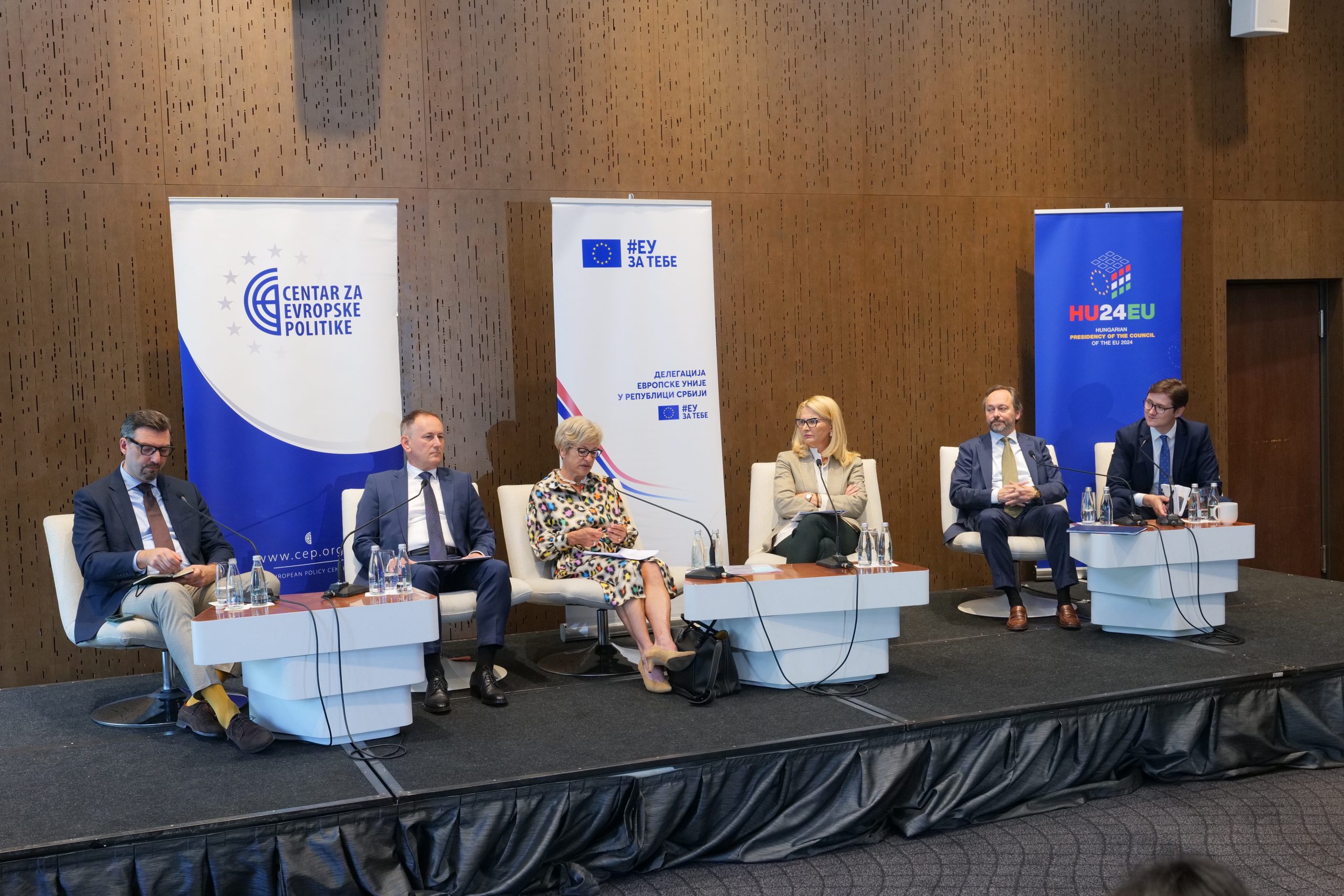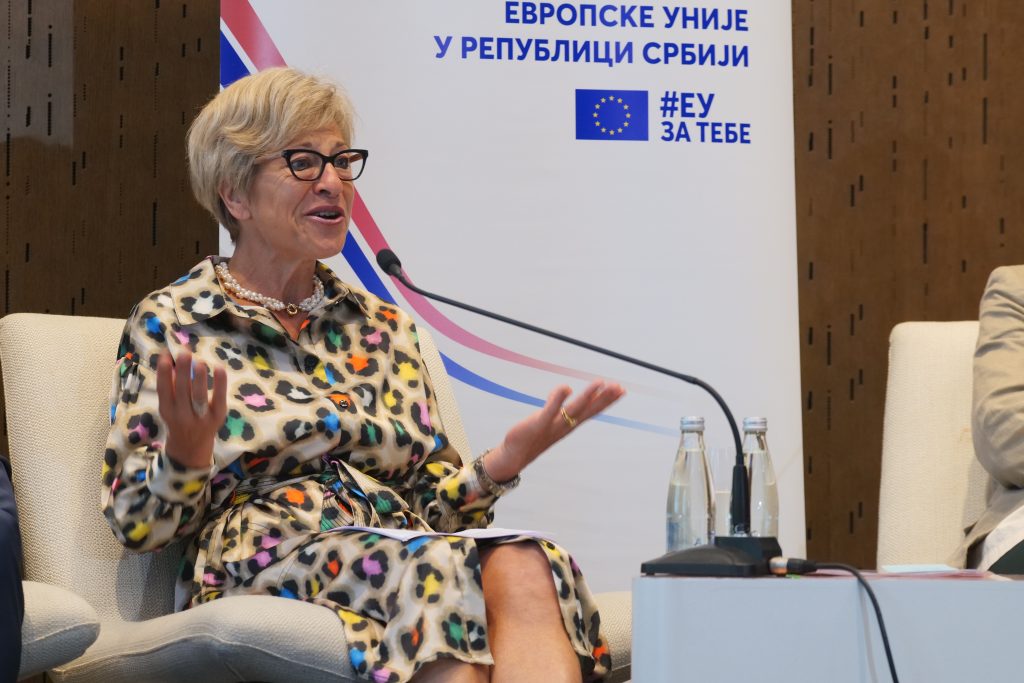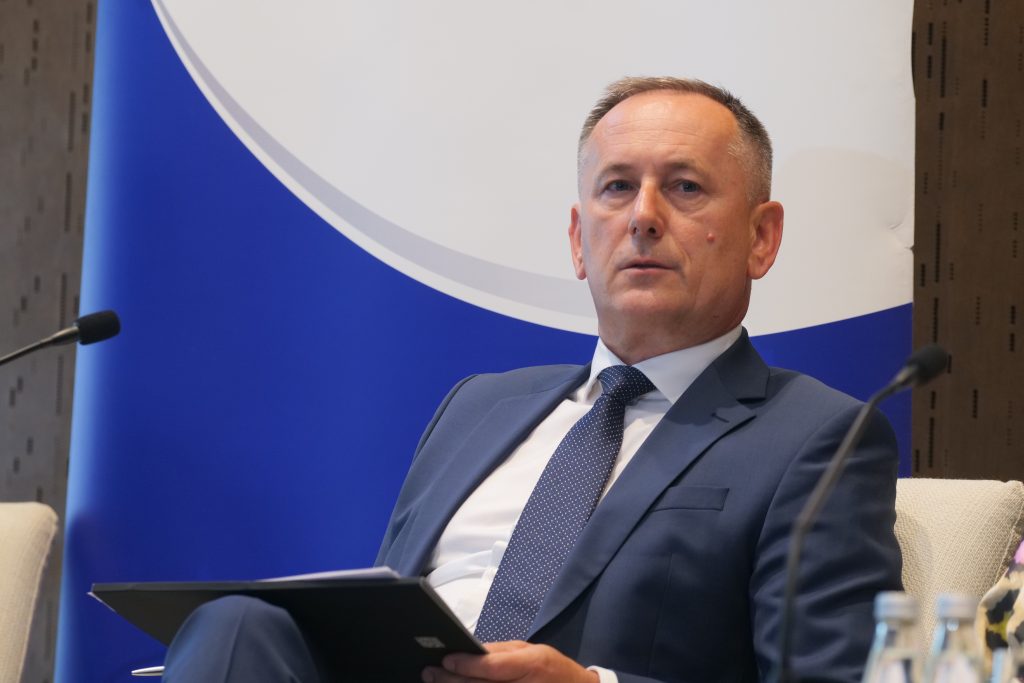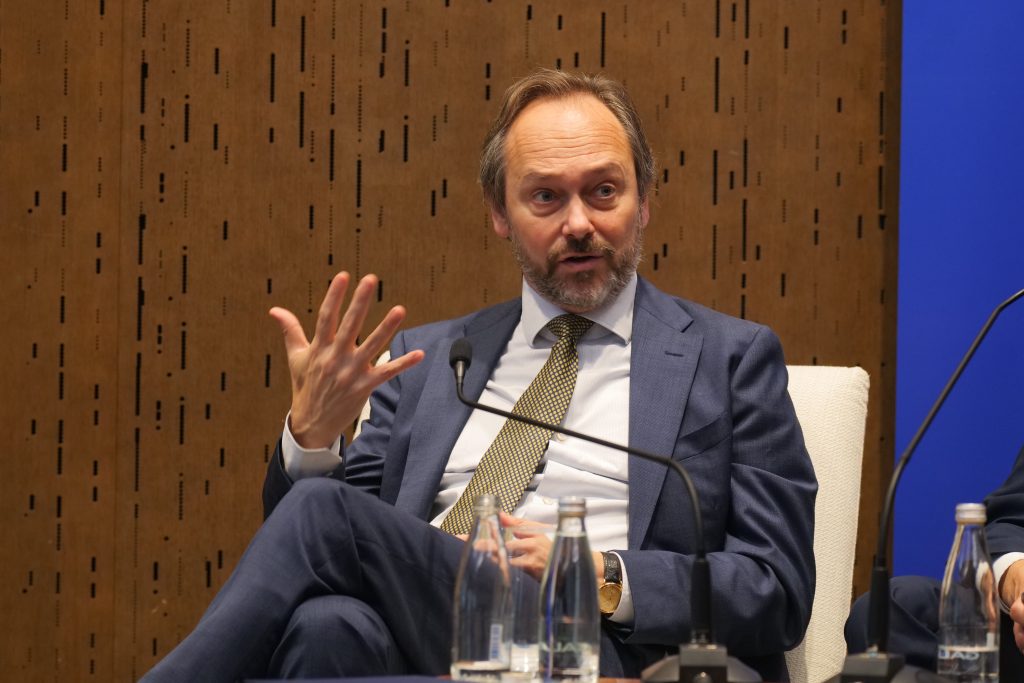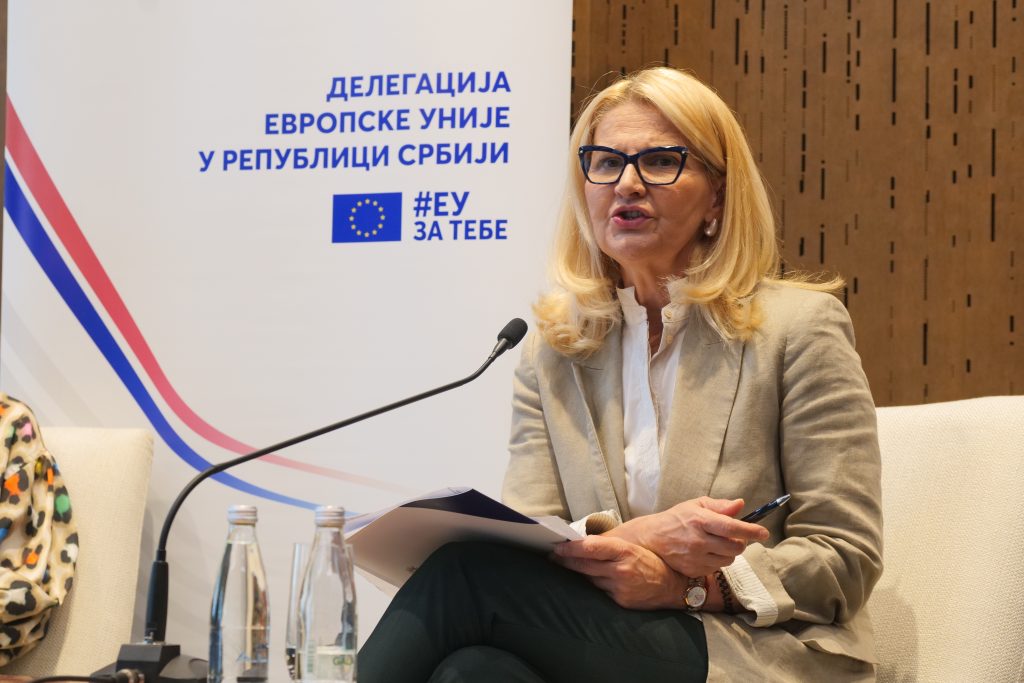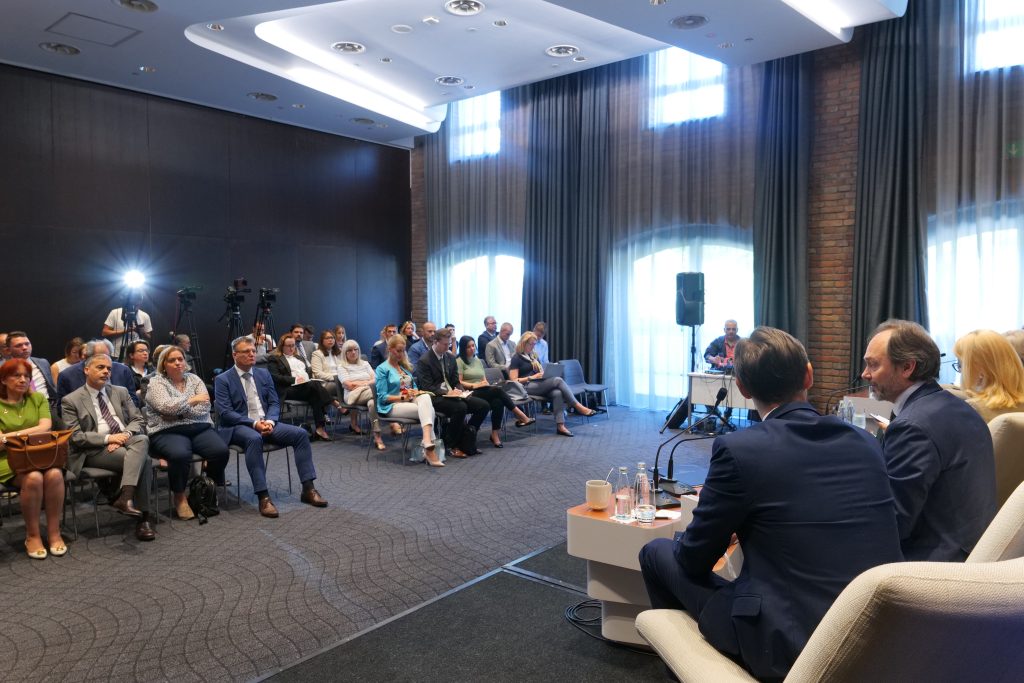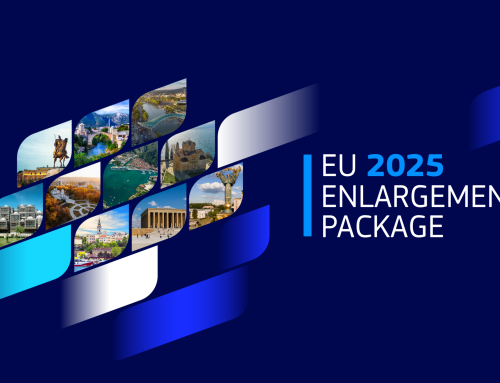The sixteenth traditional panel discussion regarding the change of the presidency of the Council of the European Union has been held today in Belgrade, jointly organized by the European Policy Center (CEP) and the Delegation of the European Union to Serbia. The panelists at the event From Belgium to Hungary: New opportunities to further accelerate the enlargement process were H.E. Cathy Buggenhout, Ambassador of the Kingdom of Belgium, H.E. Jozsef Zoltan Magyar, Ambassador of Hungary, H.E. Emanuele Giaufret, Ambassador and Head of the EU Delegation to the Republic of Serbia, Tanja Miščević, Minister for European Integration of the Republic of Serbia and Srđan Majstorović Chairman of the CEP Governing Board. The panel was moderated by Strahinja Subotić, Program Manager and Senior Researcher at CEP.
In addition to highlighting the key achievements of the Belgian presidency of the Council, the panel also aimed to clarify Hungary’s strategy for guiding the EU in the next six months. As a country that shares borders with the Western Balkans and Ukraine and as a former socialist republic, Hungary understands the difficulties faced by both new and old candidate countries on their way to the EU.
Talking about the successful Belgian presidency, the ambassador of the Kingdom of Belgium said that her country achieved everything it had planned, even in the shortened period of time, due to the break for the elections. She pointed out that Belgium’s activity in the Green Agenda, as well as in the Growth Plan for the Western Balkans, is particularly significant.
“The Growth Plan for the Western Balkans was one of the documents adopted in this short period of time. The growth plan was in the forefront of all EU member states’ minds and on their priority list,” she pointed out.
“Part of the motto of our presidency is Prepare for the future, as we believe that integration is a very important process. The EU will not be the same with 36 countries at the table. There will be huge economic differences once new members have joined, and the money will have to be spread among more countries. Preparing for the future means that the Council has work to do to receive new member states and this was adopted on June 28 at the Council meeting,” she said.
Jozsef Magyar pointed out that the slogan of the Hungarian presidency: Make Europe great again was chosen because it best reflects the focus of the Hungarian presidency – strengthening the European economy, which, as Magyar says, is “stagnant compared to other continents”.
“In 2018, the US and EU economies were on par, and now the US economy is twice the size of the EU economy. Economic growth in major EU countries is predicted to be 1%, whereas for the USA it is 3%, and 5% for China. Competitiveness was part of the trio program and Hungary wants to reinforce it with their program. We want to finalize the European competitiveness package and adopt it as a new instrument for member states,” Magyar said.
There were doubts about the Growth Plan for the Western Balkans, but we quickly delivered it, which is a reflection of the strong political will to move forward toward enlargement, Ambassador Giaufret pointed out. In the past few months, we have had three leader meetings, where we discussed concrete measures to integrate the WB into the single market, and with the Reform Agenda we will have a set of reforms for each country to accelerate this,” he added.
“With the Growth Plan, the EU is shifting its approach in terms of how it distributes funds, with the past funding of projects – the financing of the Growth Plan is something similar to what the Commission has done earlier for Member States – requiring them to undertake a set of reforms and allocating funds based on implemented reforms. This has proved successful and the same approach is now being adopted for the candidate countries. The idea is to reduce the social and economic gap between the EU and the candidate countries – and at the same time accelerate reforms related to the rule of law, the fight against corruption and organised crime,” he explained.
“We understand the geopolitical shifts and the renewed interest in enlargement after the war in Ukraine, and we would like to take advantage of that opportunity, not only through the Reform Agenda, but more broadly, as well,” said Minister Miščević. She also pointed out that Serbia’s goal is not only to open Cluster 3, but also to get ready and open Cluster 2 – Internal Market, and we would like to obtain a positive IBAR for Chapters 23 and 24 by the end of this year.
Srđan Majstorović pointed out that the Strategic Agenda 2024 – 2029 was adopted last week, and that it is clear that the European Union is starting preparations for enlargement, and that the EU internal reforms go ‘hand in hand’ with enlargement”.
However, he also reminded that 2024 marks the 10th anniversary of the beginning of Serbia’s negotiations with the EU and that the results are far from what we expected. He emphasized the importance of reforms, but also that “EU integrations never end” and that they continue in different forms even after one has become a member. He also pointed out that the road to the EU is not straight and irreversible. “Reforms that the candidate countries have to undertake are sometimes reversible and the membership is not a guarantee that everyone will avoid problems, and Serbia must learn that and resolve it in time,” Majstorović concluded.
This event is part of tradition started by CEP and the EU Info Center eight years ago, with the aim of initiating a quality debate on EU priorities from the point of view of the countries holding the presidency of the Council of the EU (outgoing and upcoming presiding countries), with reference to current topics in the accession process of Serbia to the EU. The biannual event gathers members of the diplomatic corps, representatives of state institutions and civil society organizations, and is widely covered by the media.

